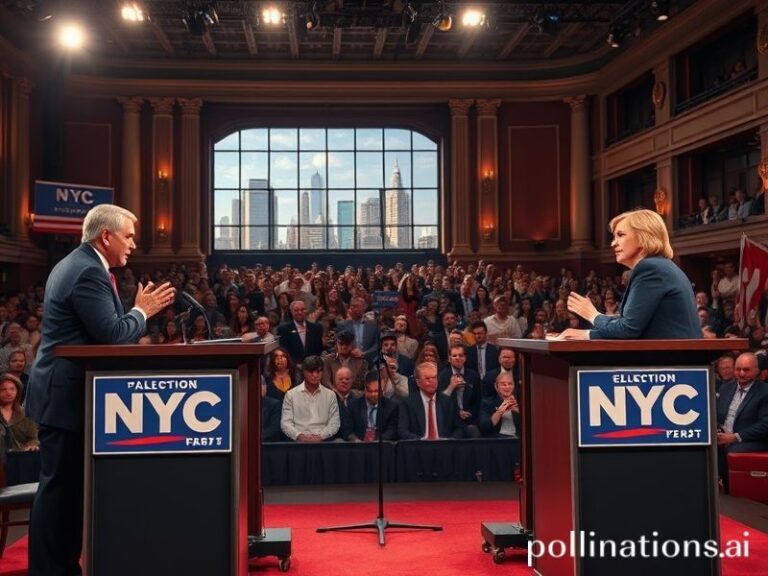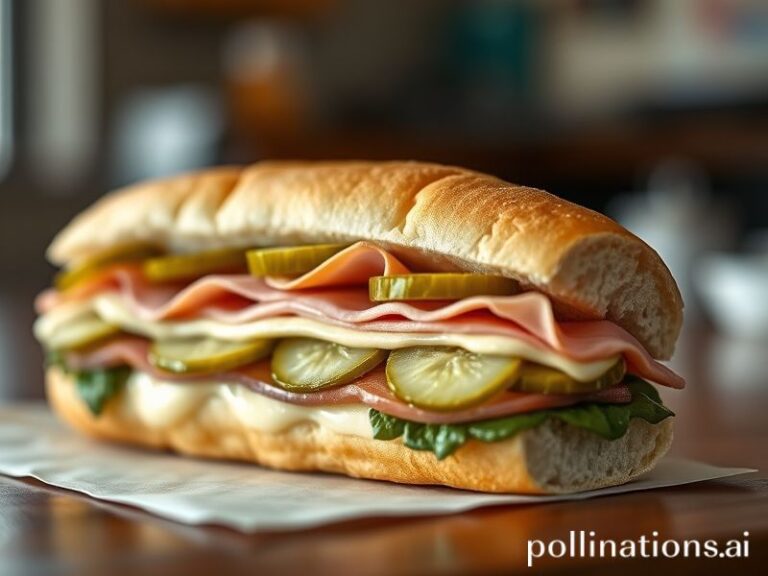Tillie Amartey: Britain’s Cheery Teen Export in a World Gone Grumpy
Tillie Amartey and the Great British Export Boom Nobody Ordered
By Our Man in the Departures Lounge, Somewhere Over the North Sea
LONDON—While the rest of the planet argues over whose submarine is louder and which hemisphere gets to keep the last polar bear, Britain has quietly pivoted to its most reliable post-imperial commodity: photogenic teenagers with unnervingly good teeth. Enter Tillie Amartey, 20, actress, presenter, and—if the Department for International Trade ever needs a new poster child—the human embodiment of a nation desperate to prove it can still ship something abroad that isn’t inflation or unexploded WWII ordnance.
To American readers, Amartey is the Cheshire-cat grin between segments on CBBC, the BBC children’s branch that doubles as a creche for future Bafta winners and rehab candidates. To the Asian streaming market, she’s the voice-over introducing Korean cartoons that have already been dubbed into six other languages—essentially a linguistic matryoshka of diminishing royalties. And to European audiences? Well, until recently, she was simply “the British girl who looks like she knows where the Wi-Fi password is hidden,” a skill once considered useless but now post-Brexit currency in negotiations with teenagers from Madrid to Munich.
The global significance, you ask? Allow me to exhale tragically. In an era when TikTok can catapult a Macedonian cat into a UN goodwill ambassador, Amartey’s cross-platform stamina is being studied by policy wonks as proof that soft power no longer requires aircraft carriers—merely a ring-light and the emotional durability of a cruise-ship comedian. The UK’s Screen Sector Taskforce recently added her name to a confidential briefing paper titled “Non-Cringe Youth Assets,” right between Harry Styles and that plasticine dog from Wallace & Gromit. The objective: keep Britannia cool without spending another royal yacht’s worth of taxpayers’ remorse.
Meanwhile, the darker corners of the internet—those fluorescent basements where nationalism goes to lift weights—have accused her of “cultural infiltration” after she used the phrase “y’all” on a Nickelodeon UK promo. Texans were flattered; the French were not. One Parisian commentator sniffed that “exporting one’s adolescence is the final stage of decadence,” apparently forgetting France’s own global teenage export, the entire discography of Christine and the Queens.
Economists, never ones to miss a bandwagon they can later derail, estimate the “Amartey Effect” at roughly 0.0003 % of UK services exports—about the same monetary heft as a week of artisanal marmalade sales to Japan. Still, in a country where the national mood swings between “Keep Calm” hysteria and performative stoicism, any nickel that lands without a customs form is celebrated as a rebuttal to gravity itself.
Of course, the young woman at the eye of this transcontinental spin cycle remains professionally chirpy. When asked by a Singaporean journalist how it feels to be a diplomatic payload, she replied, “I just want kids everywhere to know they can be on TV—even if their Wi-Fi is rubbish.” Somewhere in Beijing, a propaganda intern underlined the sentence twice: even the enemy admits infrastructure is destiny.
What happens when Amartey ages out of the CBBC demographic is a question no one in Whitehall dares spreadsheet. Britain’s last child star pivot involved a wizard franchise and ended with the Treasury relying on studio-tour stamp duty to patch holes in the NHS. Should she follow the traditional arc—edgy indie film, fragrance line, memoir that blames the parents—at least the balance-of-payments ledger gets a three-year head start before the obligatory rehab tour.
Still, in a world busy weaponizing everything from grain to microchips, there is something almost quaint about a nation weaponizing its babysitters. Tillie Amartey may not reverse climate collapse or de-occupy a peninsula, but for the next fiscal quarter she is a remittance girl in sneakers, proof that you can still export optimism—provided it’s aged 4-12 and cleared by Ofcom.
And if that isn’t a metaphor for the United Kingdom in the 2020s, then I’m a Macedonian cat with a verified passport.







